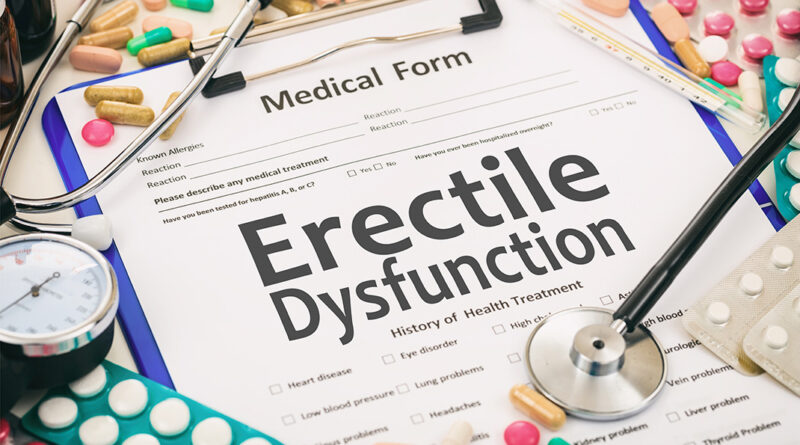Erectile Dysfunction: Common, Treatable
By JC Trussell, M.D.

Health affects every part of our lives. When our body works well, we can move, think and enjoy life without much trouble. But sometimes, health issues come up that challenge us and can be difficult to talk about. One of these issues is erectile dysfunction, often shortened to ED.
Erectile dysfunction is when a man has trouble obtaining or keeping an erection firm enough for sexual activity. While this may sound embarrassing, it is actually a very common health problem. This condition is studied carefully because it can give important clues about other health conditions, such as heart disease, diabetes or stress.
What Is Erectile Dysfunction?
Erectile dysfunction is a medical condition that happens when a man cannot get or keep an erection that is strong enough for sexual activity. An erection happens when blood flows into the penis and stays there for a while. This process involves the brain, nerves, hormones and blood vessels—all working together.
ED is not just about sexual health. It can be a warning sign of bigger health problems. For example, if blood vessels in the penis are not working, it may mean blood vessels in the heart are also in trouble. This is why doctors often check men with ED for heart disease, high blood pressure or diabetes.
ED can also affect mental health. Many men with ED feel embarrassed, ashamed or less confident. This can hurt relationships and lower quality of life. That is why doctors encourage men to talk openly about it
and seek help.
If something goes wrong in any part of this system, an erection may not happen, or it may not last long enough. Sometimes this only happens occasionally, and that is normal. But if it happens often, doctors call it ED.
ED is not the same as having a low interest in sex (low libido), although the two can sometimes be connected. It is also not just “in the head” — though stress and emotions can play a big role. It is usually a mix of body and mind factors.
 How Common Is Erectile Dysfunction?
How Common Is Erectile Dysfunction?
You may be surprised to learn that ED is very common. Research shows that millions of men experience it. In the United States, it is estimated that about 30 million men have ED. ED becomes more common with age. About 40% of men at age 40 have some trouble with erections. By age 70, that number goes up to 70%. In other words, the Massachusetts Male Aging Study (Exp. Gerontol. 2004;July 39(7)) determined that your age (for men between 40 and 100 years of age) corresponded directly to the percentage of men that age having some degree of erectile dysfunction. Doctors believe that ED may be even more common than the numbers show, because many men feel too embarrassed to talk about it. This means ED is likely under-reported.
ED may not wait until 40 years of age to cause a problem. Men in their 20s and 30s can experience it—especially if they smoke, drink heavily, are stressed or have certain health problems. Anyone with ED, regardless of age should bring up this issue with their doctor.
What Causes Erectile Dysfunction?
 ED has many different causes. Doctors usually group them into physical causes and psychological (emotional or psychological) causes. Often, both play a role.
ED has many different causes. Doctors usually group them into physical causes and psychological (emotional or psychological) causes. Often, both play a role.
1. Physical Causes
Most cases of ED have something to do with physical health. The main causes include:
• Heart and blood vessel problems: An erection depends on healthy blood flow. Conditions like high blood pressure, clogged arteries or heart disease can reduce blood flow, making erections harder to achieve.
• Diabetes: This disease damages blood vessels and nerves, both of which are needed for erections. Men with diabetes are about three times more likely to develop ED.
• Hormone problems: Low levels of testosterone can reduce sexual function. Thyroid problems can also play a role.
• Nerve damage: Injuries to the spinal cord, prostate surgery, or diseases like multiple sclerosis can damage nerves and cause ED.
• Lifestyle choices: Smoking, drinking too much alcohol, lack of exercise, or being overweight all increase the risk.
• Medicines: Some drugs for blood pressure (especially beta-blockers such as atenolol and labetalol), depression, or cancer may cause ED as a side effect.
2. Psychological Causes
The brain is a very important part of sexual function. Emotional health can affect erections just as much as physical health. Some common psychological causes are:
• Stress: Work stress, family stress, or money problems can interfere with sexual function.
• Anxiety: Worrying about sexual performance can actually cause ED, creating a cycle of fear and difficulty.
• Depression: This mental health condition lowers energy and interest in activities, including sex.
• Relationship problems: Tension between partners can reduce closeness and make ED worse.
How Doctors Diagnose Erectile Dysfunction
When a man goes to the doctor for ED, the doctor will ask questions about his medical history, lifestyle, and emotional health. The doctor may:
• Do a physical exam.
• Check blood pressure, heart health and hormone levels.
• Run blood tests for diabetes or cholesterol.
• Ask about stress, depression or relationship issues.
How Is Erectile Dysfunction Treated?
The good news is that ED is treatable. In fact, most men who seek help can improve their condition. Treatment depends on the cause, but here are the main options:
1. Lifestyle Changes
Doctors often recommend healthy habits first. These can make a big difference:
• Exercising regularly to improve blood flow.
• Eating a balanced diet to reduce heart risks.
• Quitting smoking and limiting alcohol.
• Getting enough sleep.
• Managing stress through relaxation or counseling.
2. Medicine
There are well-known prescription medicines for ED. They work by helping blood flow to the penis. Some of the most common are sildenafil, tadalafil, vardenafil, and avanafil. These medicines are safe for most men but require a doctor’s approval. The one contraindication to treating ED with pills is taking (or carrying) nitroglycerine—for chest pain.
Unfortunately, pills may not work forever. There are cases where a pill that used to work, but is now no longer effective. As we get older, one has to remember that ED tends to worsen each and every year. Moreover, ED is exponentially worsened as other health conditions are diagnosed—such as diabetes, lipid disorders, obesity, hypertension and heart disease. Despite this, there is good news. By changing to a different pill, there is a 30% chance the new pill will work better. Not because one pill is universally better, but because each man’s body will respond to each pill differently.
3. Counseling or Therapy
If stress, anxiety or depression is a cause, talking with a therapist can help. Couples therapy may also be useful if relationship issues play a role.
4. Medical Devices
For men who cannot use medicine, special vacuum pumps can help draw blood into the penis. A band (confidence ring) is then used to keep the erection.
5. Injection therapy
There is an injectable option available to treat ED. Using a really small needle, medicine is injected into the side of the penis causing the penile blood vessels to dilate—thereby creating an erection. Almost all men report that the shot is painless, and that the erection occurs within 10 minutes.
6. Surgery
When pills, the vacuum or injections are no longer working (or desired), your doctor may recommend a penile implant. These are devices placed inside the penis to create an erection. The most common device is inflatable…whereby a pump placed inside the scrotum is pressed to transfer sterile fluid into penile cylinders. This allows the cylinders to become hard making the penis functional. When no longer needed, a release valve (on the same scrotal pump), is pressed, allowing the penis to deflate and resume a flaccid state.
Myths and Facts About ED
There are many myths about ED. Let’s clear up a few:
• Myth: Only old men get ED.
Fact: While age increases the risk, younger men can also develop ED.
• Myth: ED is just in the mind.
Fact: Emotions matter, but physical health problems are often the main cause.
• Myth: Nothing can be done about ED.
Fact: Most cases can be treated successfully with modern medicine.
• Myth: Having ED means you are not “manly.”
Fact: ED is a medical condition, just like diabetes or high blood pressure. It does not define a person’s worth.
Preventing Erectile Dysfunction
While not every case of ED can be prevented, men can reduce their risk by taking care of their health. Important steps include:
• Staying active and exercising.
• Keeping a healthy weight.
• Not smoking.
• Managing stress in healthy ways.
• Going for regular checkups with the doctor.
Taking care of the body and mind helps with sexual health, but it also protects the heart, brain, and overall well-being.

